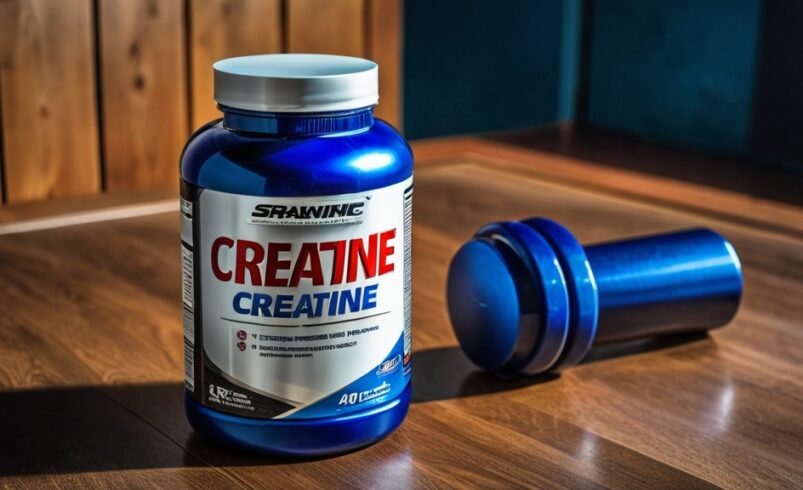Creatine: The Most Researched Supplement Explained
- November 7, 2025
- 0
Creatine is a naturally occurring compound found in small amounts in certain foods. It primarily resides in muscle cells, where it plays a crucial role in energy production.
Creatine is a naturally occurring compound found in small amounts in certain foods. It primarily resides in muscle cells, where it plays a crucial role in energy production.

Creatine is a naturally occurring compound found in small amounts in certain foods. It primarily resides in muscle cells, where it plays a crucial role in energy production. The body synthesizes creatine from amino acids, specifically arginine, glycine, and methionine.
Many athletes and fitness enthusiasts use creatine as a dietary supplement to enhance performance. Creatine exists in various forms, with creatine monohydrate being the most researched and widely used. This compound helps replenish adenosine triphosphate (ATP), the primary energy carrier in cells.
By increasing ATP availability, creatine supports high-intensity exercise and muscle growth.
Creatine enhances muscle performance by increasing the availability of ATP during short bursts of intense activity. When you engage in high-intensity workouts, your body relies on ATP for immediate energy. Creatine supplementation boosts your muscle’s phosphocreatine stores, allowing for quicker ATP regeneration.
This increased energy availability translates to improved strength and power output. Athletes often experience enhanced performance in activities like sprinting, weightlifting, and high-intensity interval training. As a result, creatine can lead to more effective workouts and better overall results.

Numerous studies support the efficacy of creatine supplementation for improving athletic performance. Research shows that creatine increases muscle mass, strength, and exercise capacity. It does this by promoting greater training volume and intensity.
Creatine also influences cellular hydration. When muscles store more creatine, they draw in water, leading to increased cell volume. This process can stimulate muscle protein synthesis, contributing to muscle growth over time.
While creatine monohydrate is the most popular form, several other types exist. Creatine ethyl ester, buffered creatine, and creatine hydrochloride are among the alternatives. Each form has unique properties and potential benefits.
Creatine monohydrate remains the gold standard due to its extensive research backing. However, some individuals may prefer other forms for specific reasons, such as improved solubility or reduced gastrointestinal discomfort. It’s essential to understand these differences when choosing a supplement.
Many athletes follow a loading phase when starting creatine supplementation. This phase typically involves taking a higher dose for a short period, usually around five to seven days. The goal is to saturate the muscles with creatine quickly.
After the loading phase, individuals transition to a maintenance dose. This lower daily dose helps maintain elevated creatine levels in the muscles. Some people choose to skip the loading phase and start with a consistent maintenance dose instead.

Creatine supplementation offers numerous benefits beyond improved athletic performance. It can enhance muscle mass, strength, and recovery. Many users report increased workout intensity and volume, leading to better results over time.
Additionally, creatine may support overall health by improving cellular function and reducing oxidative stress. Some studies suggest it could have neuroprotective effects as well. These benefits make creatine a popular choice among athletes and fitness enthusiasts alike.
While creatine is often associated with strength training, it can also benefit endurance athletes. Although its primary role is in short bursts of high-intensity activity, it can help improve overall training capacity. Enhanced recovery from intense workouts allows endurance athletes to train harder and more frequently.
Some research indicates that creatine may improve performance in events requiring repeated sprints or high-intensity efforts during endurance activities. This can lead to better race times and overall performance improvements.
Emerging research suggests that creatine may also support cognitive function. The brain requires significant energy to function optimally, and creatine plays a role in ATP production here as well. Some studies indicate that creatine supplementation can enhance memory and cognitive performance.
Athletes often experience mental fatigue during intense training or competition. By supporting brain energy levels, creatine may help maintain focus and mental clarity during these demanding situations.
Creatine supplementation can aid muscle recovery after intense workouts. It helps reduce muscle soreness and inflammation, allowing for quicker recovery times. This benefit is particularly valuable for athletes who train frequently or at high intensities.
By promoting faster recovery, creatine enables individuals to return to training sooner and maintain their workout schedules. This can lead to improved long-term performance and results.
Creatine is generally considered safe for most individuals when taken as directed. However, some people may experience mild side effects such as gastrointestinal discomfort or cramping. Staying well-hydrated can help mitigate these issues.
It’s essential to consult with a healthcare professional before starting any supplement regimen, especially if you have pre-existing health conditions or concerns. Overall, the benefits of creatine often outweigh potential risks for healthy individuals.
When selecting a creatine supplement, consider factors such as purity, form, and brand reputation. Look for products that contain high-quality creatine monohydrate without unnecessary additives or fillers. Reading customer reviews can provide insight into product effectiveness.
Additionally, consider your specific goals and preferences when choosing a form of creatine. Some individuals may prefer powders, while others might opt for capsules or chewables. Ultimately, finding a product that fits your needs will enhance your supplementation experience.